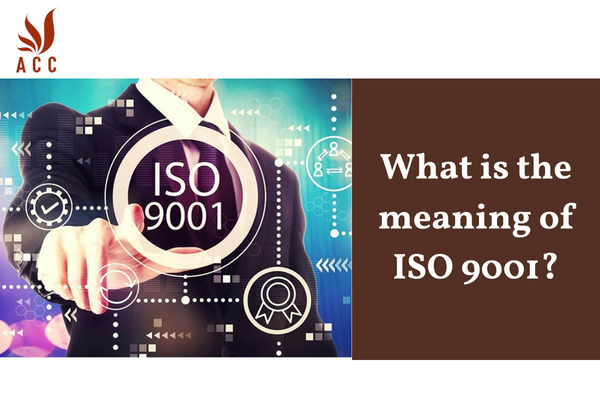A QMS is a systematic approach to managing an organization to ensure that it meets the needs of its customers and other stakeholders. ISO 9001 provides organizations with a set of requirements that they must meet in order to be certified to the standard. This blog post will provide an overview of the meaning of ISO 9001. We will discuss the purpose of ISO 9001, the benefits of ISO 9001 certification, and the requirements of ISO 9001.

What is the meaning of ISO 9001?
1. What is a quality management system?
A quality management system is a set of processes and procedures that organizations use to ensure that their products and services meet the needs of their customers. It includes processes for planning, implementing, and monitoring quality, as well as for continuous improvement.
2. What are the requirements of ISO 9001?
ISO 9001 specifies the following requirements for a QMS:
- Leadership: The organization's top management must be committed to quality and must provide leadership and support for the QMS.
- Planning: The organization must plan its QMS to meet its quality objectives.
- Support: The organization must provide the resources and infrastructure necessary to support its QMS.
- Operation: The organization must implement its QMS to meet its quality objectives.
- Measurement, analysis, and improvement: The organization must measure, analyze, and improve its QMS on an ongoing basis.
3. What are the benefits of ISO 9001 certification?
There are many benefits to ISO 9001 certification, including:
- Improved quality: Organizations that implement ISO 9001 often see improvements in the quality of their products and services.
- Increased customer satisfaction: ISO 9001 certification can help organizations to improve customer satisfaction by meeting their needs and expectations.
- Reduced costs: ISO 9001 certification can help organizations to reduce costs by improving efficiency and preventing defects.
- Improved competitiveness: ISO 9001 certification can help organizations to compete more effectively in the global marketplace.
4. How to get ISO 9001 certified?
To get ISO 9001 certified, an organization must undergo an audit by a third-party certification body. The audit will assess whether the organization meets the requirements of ISO 9001.
ISO 9001 is a valuable tool for organizations of all sizes and in all industries. It can help organizations to improve their quality management processes, meet the needs of their customers, and achieve their business goals.
5. Frequently asked questions
Q1: What is ISO 9001?
ISO 9001 is an international standard for quality management systems (QMS) developed by the International Organization for Standardization (ISO). It provides a framework for organizations to ensure that their products and services consistently meet customer requirements and regulatory standards.
Q2: Why is ISO 9001 important?
ISO 9001 is important because it helps organizations establish a systematic approach to quality management. By following the principles of ISO 9001, businesses can enhance customer satisfaction, improve processes, and demonstrate a commitment to delivering high-quality products and services.
Q3: How does ISO 9001 benefit businesses?
ISO 9001 benefits businesses by improving efficiency, reducing errors, and increasing customer satisfaction. It also enhances the organization's credibility and competitiveness in the marketplace, as it signals a commitment to quality and continual improvement.
Q4: What are the key principles of ISO 9001?
The key principles of ISO 9001 include a strong customer focus, leadership engagement, a process approach, continual improvement, evidence-based decision making, and a mutually beneficial supplier relationship. These principles form the foundation for effective quality management.
Q5: How does an organization become ISO 9001 certified?
To become ISO 9001 certified, an organization needs to implement a quality management system that complies with the requirements of the standard. This involves developing and documenting processes, conducting internal audits, and undergoing a certification audit by a third-party certification body.
Q6: Can ISO 9001 be applied to any type of organization?
Yes, ISO 9001 is designed to be adaptable to various types and sizes of organizations across different industries. Whether it's a manufacturing company, service provider, or public sector organization, the principles of ISO 9001 can be applied to establish an effective quality management system.
Nội dung bài viết:






Bình luận